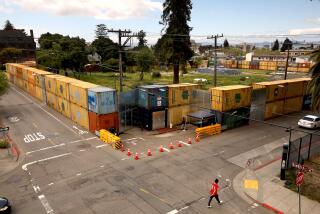Legislative Panel OKs Compromise on Quake Insurance
A compromise bill to create a state earthquake insurance agency was approved by a legislative conference committee in Sacramento on Wednesday night after a three-month struggle.
The key vote moving the bill out of the committee was cast by state Sen. Charles M. Calderon (D-Whittier), the chairman, after a series of new negotiations with Republican Assembly leaders that changed terms of the package slightly.
The bill now heads for the Assembly and state Senate floors, but not before next week, after a hearing on it is held Monday by the Senate Insurance Committee. That panel is headed by one of the measureâs most persistent opponents, Herschel Rosenthal (D-Los Angeles).
Rosenthal cast the only vote against the bill in the conference committee. However, Rosenthalâs own committee cannot block the bill, which will become law immediately if it passes by a two-thirds margin in each house.
Approval in the conference committee came just days after the Internal Revenue Service conditionally approved a federal tax exemption for the proposed California Earthquake Authority.
The measure, strongly supported by state Insurance Commissioner Chuck Quackenbush and the insurance industry and opposed by leading consumer organizations, would put most residential earthquake insurance policies under the authorityâs control.
Companies enlisting in the authority would sell the state policies, but the state would oversee administration and payment of claims.
Insurers who paid $14.5 billion in Northridge earthquake damage claims have backed the new agency in order to cap their liability for damage to homes and condominiums.
In return, Quackenbush and legislative backers hope that the companies will resume full marketing of regular homeowners policies. Sales of those policies have been reduced because of the stateâs requirement that insurers offering homeowners policies also offer earthquake policies.
Quackenbush spokesman Richard Wiebe on Wednesday night called the billâs passage out of the conference committee âgreat newsâ and remarked that with state-run quake insurance, âCalifornia can look forward to a vibrant and competitive homeowners insurance market.â
A disclosure statement to be affixed to each quake policy, according to a provision in the bill, would clearly warn policyholders that they are getting less coverage than provided by policies in the past.
Also, the mandated disclosure would warn that if a big enough quake were to occur, such as one causing more than $10.5 billion in insured residential damage, all claims might not be honored or might be honored only partially.
Another possibility broached in the legislation is that earthquake policyholders statewide could be assessed an additional 20% premium if damages exceeded the authorityâs reserves.
In another development, acting at the behest of the Consumers Union, Assemblyman Kevin Murray (D-Los Angeles) has introduced an alternative bill that would establish a stand-alone earthquake policy in the FAIR plan instead of creating the authority.
The FAIR plan is the stateâs homeowner and earthquake insurer of last resort. Quackenbush recently ordered a sharp restriction in its sales.
Under the Murray proposal, the FAIR plan would be expanded dramatically in the earthquake field and the companies would no longer be required to offer quake insurance on their own.
If premiums plus reinsurance were unable to pay all claims, however, the companies could still be assessed, Murray said. Policyholder assessments are ruled out.
Murray called his proposal âa more equitable alternative for California that is fair to both insurers and consumers.â
But reaction from both the industry and the insurance commissionerâs office was negative.
Wiebe said: âThe commissioner has always welcomed fresh ideas about how to solve the homeowners and earthquake insurance problems. This plan, however, would make a bad solution worse.â
Wiebe said the FAIR plan already has inadequate resources to pay claims, and âthis would increase the gap between revenues and potential expenditures.
âWe donât know if reinsurance would be available, or at what cost, and without the tax-exempt status and capital market participation features of the Earthquake Authority, it is likely that the cost under the plan would be prohibitive,â he stated.
More to Read
Get the L.A. Times Politics newsletter
Deeply reported insights into legislation, politics and policy from Sacramento, Washington and beyond. In your inbox three times per week.
You may occasionally receive promotional content from the Los Angeles Times.










